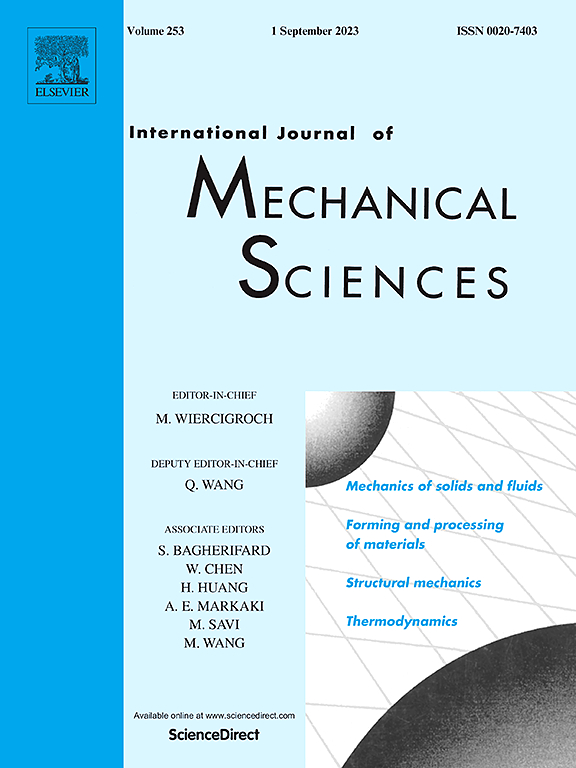Unsupervised transfer learning for monitoring CFRP responses using discrete strains
IF 7.1
1区 工程技术
Q1 ENGINEERING, MECHANICAL
International Journal of Mechanical Sciences
Pub Date : 2025-03-11
DOI:10.1016/j.ijmecsci.2025.110142
引用次数: 0
Abstract
A deep learning (DL) model based on an unsupervised domain adaptation (UDA) approach is developed to learn shared features from labeled simulation datasets and transfer them to unlabeled experimental data for predicting CFRP displacement response and delamination growth. Different from traditional transfer learning methods based on fine-tuning strategies, the UDA-DL model focuses on the unlabeled target domain, aiming to learn prior knowledge in the source domain data for transfer. Specifically, a DL model with an encoder-decoder architecture is first built to construct an inverse mapping between discrete strains and displacement responses. The model is verified to efficiently and accurately predict the displacement field based on strains. Furthermore, the impact of the number of strain points and data type on the prediction of the out-of-plane displacement field is discussed. Subsequently, the UDA strategy is introduced into the DL model, which realizes the transfer of simulated data to experimental data based on shared features extracted by domain separation. The comparison with experimental results confirms the potential of the UDA-DL model in the prediction of displacement fields and delamination growth. This study provides a promising solution to the challenge of state sensing with unlabeled monitoring data in structural health monitoring.

本研究开发了一种基于无监督领域适应(UDA)方法的深度学习(DL)模型,用于从标注的仿真数据集中学习共享特征,并将其转移到未标注的实验数据中,以预测 CFRP 的位移响应和分层生长。与基于微调策略的传统迁移学习方法不同,UDA-DL 模型侧重于未标记的目标域,旨在学习源域数据中的先验知识,以便进行迁移。具体来说,首先建立一个具有编码器-解码器架构的 DL 模型,以构建离散应变和位移响应之间的反映射。经过验证,该模型能根据应变高效、准确地预测位移场。此外,还讨论了应变点数量和数据类型对平面外位移场预测的影响。随后,在 DL 模型中引入了 UDA 策略,根据域分离提取的共享特征实现了模拟数据与实验数据的转移。与实验结果的对比证实了 UDA-DL 模型在预测位移场和分层生长方面的潜力。这项研究为结构健康监测中使用无标记监测数据进行状态传感的挑战提供了一个很有前景的解决方案。
本文章由计算机程序翻译,如有差异,请以英文原文为准。
求助全文
约1分钟内获得全文
求助全文
来源期刊

International Journal of Mechanical Sciences
工程技术-工程:机械
CiteScore
12.80
自引率
17.80%
发文量
769
审稿时长
19 days
期刊介绍:
The International Journal of Mechanical Sciences (IJMS) serves as a global platform for the publication and dissemination of original research that contributes to a deeper scientific understanding of the fundamental disciplines within mechanical, civil, and material engineering.
The primary focus of IJMS is to showcase innovative and ground-breaking work that utilizes analytical and computational modeling techniques, such as Finite Element Method (FEM), Boundary Element Method (BEM), and mesh-free methods, among others. These modeling methods are applied to diverse fields including rigid-body mechanics (e.g., dynamics, vibration, stability), structural mechanics, metal forming, advanced materials (e.g., metals, composites, cellular, smart) behavior and applications, impact mechanics, strain localization, and other nonlinear effects (e.g., large deflections, plasticity, fracture).
Additionally, IJMS covers the realms of fluid mechanics (both external and internal flows), tribology, thermodynamics, and materials processing. These subjects collectively form the core of the journal's content.
In summary, IJMS provides a prestigious platform for researchers to present their original contributions, shedding light on analytical and computational modeling methods in various areas of mechanical engineering, as well as exploring the behavior and application of advanced materials, fluid mechanics, thermodynamics, and materials processing.
 求助内容:
求助内容: 应助结果提醒方式:
应助结果提醒方式:


